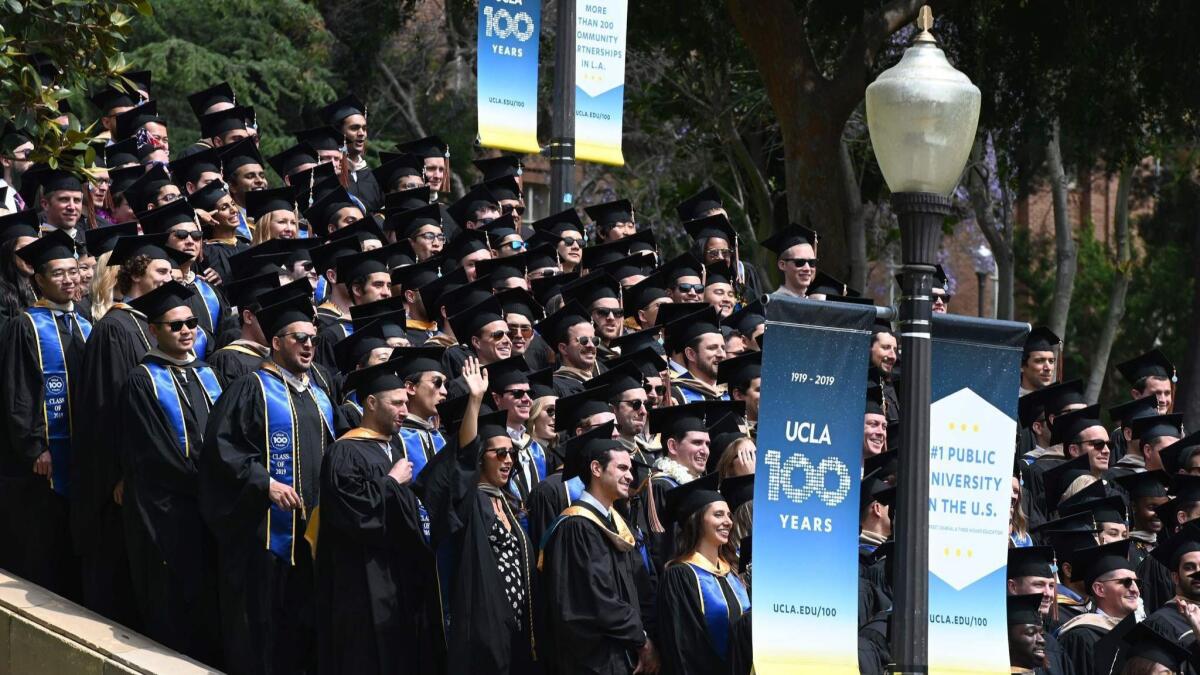Column: In act of brinkmanship, a big publisher cuts off UC’s access to its academic journals

The bitter battle between the University of California, a leading source of published research papers, and Elsevier, the world’s largest publisher of research papers, just got more bitter.
As of Wednesday, Elsevier cut off access by UC faculty, staff and students to articles published since Jan. 1 in 2,500 Elsevier journals, including respected medical publications such as Cell and the Lancet and a host of engineering and scientific journals. Access to most material published in 2018 and earlier remains in force.
The move by Elsevier is the latest development in a conflict that has been brewing since last year, when the university’s last five-year contract with Elsevier expired. UC demanded that the new contract reflect the principle of open access — that work produced on its campuses be available to all outside readers, for free.
UC is committed to making all the work of all of its authors freely available.
— UC Office of Scholarly Communication
That was a direct challenge to the business model of Elsevier and other big academic publishers. Traditionally, the publishers accept papers for publication for free but charge steep subscription fees. UC is determined to operate under an alternative model, in which researchers pay to have their papers published but not for subscriptions.
What kept the two sides apart was not merely the difference in approaches, but the question of fees. UC paid $11 million for Elsevier subscriptions last year — about 25% of its overall subscription budget — while its researchers spent an estimated $1 million more on publication fees on papers subject to open access. The university proposed a new deal under which publication fees and subscriptions would be rolled together for a single sum in a model known as “read and publish.”
In part, that was a reflection of concerns over a continual run-up in journal subscription costs that UC, along with many other academic institutions, consider to be unsustainable. The very idea of placing scientific research behind a subscription paywall, moreover, can’t be reconciled with the idea that research should be made as widely available as possible. That’s especially so when the same institutions that generate research papers are made to pay for access to them.
“Overwhelmingly the faculty, who have given this a great deal of thought, know this is a matter of principle,” says Robert May, a member of the philosophy department at UC Davis and chair of the UC Academic Council. The council issued a statement Wednesday expressing its determination for UC to “help change the system of scholarly communication for the betterment of all.”
UC isn’t the only institution to stage a frontal assault on this model. Open access has been spreading in academia and in scholarly publishing; academic consortiums in Germany and Sweden also have demanded read-and-publish deals with Elsevier, which cut them off after they failed to reach deals last year. Those researchers are still cut off, according to Gemma Hersh, Elsevier’s vice president for global policy. Smaller deals have been made in recent months with research institutions in Norway and Hungary.
UC is probably the largest single producer of research papers to make a stand for open access — and an uncompromising stand at that. The university says it generates nearly 10% of all published research in the United States. That has made it a significant partner of Elsevier, which has published about 18% of all UC output.
The traditional model has been a gold mine for scholarly publishers such as Elsevier. The scientific, technical and medical publishing arm of its Netherlands-based parent, Relx, recorded about $1.2 billion in operating profit on about $3.2 billion in revenue in 2018, a gratifying 37.5% operating profit margin.
The clash of policies led UC to allow its Elsevier subscriptions to lapse as of last Dec. 31. The publisher allowed scholarly access to continue while it tried to reach a new agreement with the university. With no noticeable progress having been made, Elsevier finally pulled the plug.
The publisher is rather cagey about its action. In a statement it emailed to UC faculty who were serving as editors of some of its journals, Elsevier wrote that it “sadly had to move forward with [UC’s] request to cancel access.” That’s spin that places the onus entirely on the university: In fact, UC wanted to continue access, but under new terms.
The university, for its part, cited Elsevier’s “refusal to address in any meaningful way our dual goals of cost neutrality and open access,” in the words of Dennis J. Ventry, a law professor at UC Davis who is vice chair of the academic senate’s committee on library and scholarly communication. He says the publisher’s last offer would have increased UC costs by 80% over three years, “hardly cost neutrality.”
Elsevier says its proposal would have allowed a fivefold increase in the number of UC articles it published under open access — from about 350 now to 1,750 — while increasing the overall bill to UC by no more than annual inflation. Elsevier says on a website it established to explain its position that open-access publishing fees for the estimated 5,000 papers UC publishes per year through the company would run to about $15 million, on top of the $11 million in subscriptions.
“We understand that’s not a feasible amount,” Hersh told me. She said the publisher’s proposal aimed to move UC “along that journey [to open access] in a managed and sustainable way.”
But university officials say the proposal also would have required UC to “forgo perpetual access to a significant number of Elsevier journals” and would have barred open-access publishing in some especially important journals, including Cell and the Lancet. “UC is committed to making all the work of all of its authors freely available,” the university’s office of scholarly communication said in a statement posted online.
University officials acknowledge that the cutoff of direct access to Elsevier journals will cause some inconvenience on UC campuses. Almost any article sought by a campus researcher can be found legally through interlibrary loans, online repositories such as Google scholar or PubMed, or directly from its author.
“We know we can provide access to everything through one mechanism or another,” says Jeffrey MacKie-Mason, the university librarian. “We’ve always provided access to scholarly research for things we don’t have subscriptions to. Now we’ll be doing that for Elsevier articles.”
Securing access may take a few days longer and a small financial outlay he says, “but there are ways to do it and we’re prepared to make sure that our faculty and students get to read everything they want to read.”
Under the circumstances, it looks like Elsevier may have picked a fight with the wrong adversary. While the open-access movement is growing, “the reality is that the majority of the world’s articles are still published under the subscription model, and there is a cost associated with reading those articles,” Hersh says.
But it’s hard to imagine that the open-access trend will slow in the future, much less reverse. Elsevier has been holding its ground, but with a scholarly behemoth like UC on the offensive, there’s no telling how long its defense may hold.
Keep up to date with Michael Hiltzik. Follow @hiltzikm on Twitter, see his Facebook page, or email [email protected].
Return to Michael Hiltzik’s blog.
More to Read
Inside the business of entertainment
The Wide Shot brings you news, analysis and insights on everything from streaming wars to production — and what it all means for the future.
You may occasionally receive promotional content from the Los Angeles Times.











